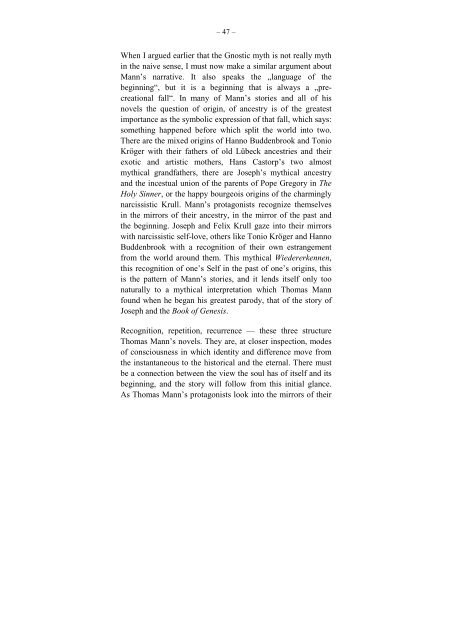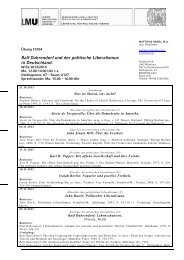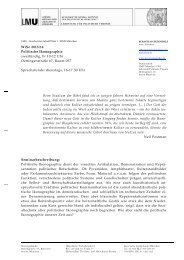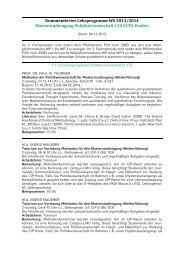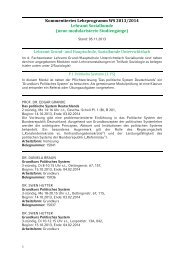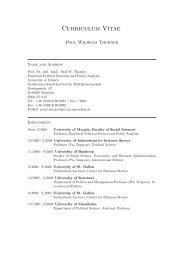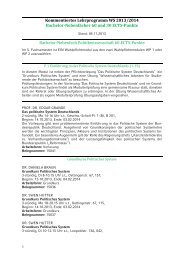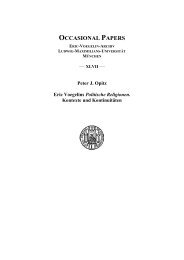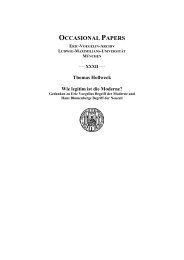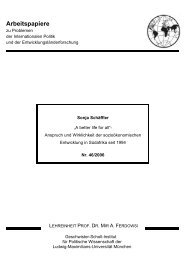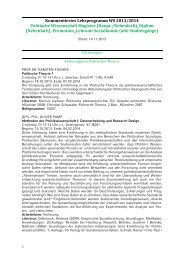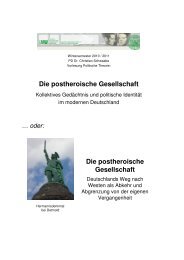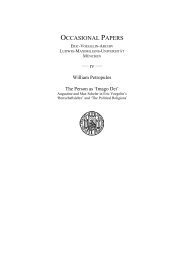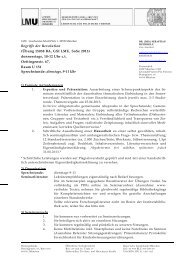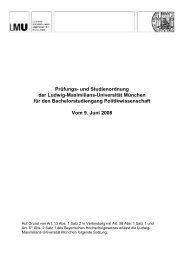THOMAS HOLLWECK is Associate Professor of German at
THOMAS HOLLWECK is Associate Professor of German at
THOMAS HOLLWECK is Associate Professor of German at
Create successful ePaper yourself
Turn your PDF publications into a flip-book with our unique Google optimized e-Paper software.
– 47 –<br />
When I argued earlier th<strong>at</strong> the Gnostic myth <strong>is</strong> not really myth<br />
in the naive sense, I must now make a similar argument about<br />
Mann’s narr<strong>at</strong>ive. It also speaks the „language <strong>of</strong> the<br />
beginning“, but it <strong>is</strong> a beginning th<strong>at</strong> <strong>is</strong> always a „precre<strong>at</strong>ional<br />
fall“. In many <strong>of</strong> Mann’s stories and all <strong>of</strong> h<strong>is</strong><br />
novels the question <strong>of</strong> origin, <strong>of</strong> ancestry <strong>is</strong> <strong>of</strong> the gre<strong>at</strong>est<br />
importance as the symbolic expression <strong>of</strong> th<strong>at</strong> fall, which says:<br />
something happened before which split the world into two.<br />
There are the mixed origins <strong>of</strong> Hanno Buddenbrook and Tonio<br />
Kröger with their f<strong>at</strong>hers <strong>of</strong> old Lübeck ancestries and their<br />
exotic and art<strong>is</strong>tic mothers, Hans Castorp’s two almost<br />
mythical grandf<strong>at</strong>hers, there are Joseph’s mythical ancestry<br />
and the incestual union <strong>of</strong> the parents <strong>of</strong> Pope Gregory in The<br />
Holy Sinner, or the happy bourgeo<strong>is</strong> origins <strong>of</strong> the charmingly<br />
narc<strong>is</strong>s<strong>is</strong>tic Krull. Mann’s protagon<strong>is</strong>ts recognize themselves<br />
in the mirrors <strong>of</strong> their ancestry, in the mirror <strong>of</strong> the past and<br />
the beginning. Joseph and Felix Krull gaze into their mirrors<br />
with narc<strong>is</strong>s<strong>is</strong>tic self-love, others like Tonio Kröger and Hanno<br />
Buddenbrook with a recognition <strong>of</strong> their own estrangement<br />
from the world around them. Th<strong>is</strong> mythical Wiedererkennen,<br />
th<strong>is</strong> recognition <strong>of</strong> one’s Self in the past <strong>of</strong> one’s origins, th<strong>is</strong><br />
<strong>is</strong> the p<strong>at</strong>tern <strong>of</strong> Mann’s stories, and it lends itself only too<br />
n<strong>at</strong>urally to a mythical interpret<strong>at</strong>ion which Thomas Mann<br />
found when he began h<strong>is</strong> gre<strong>at</strong>est parody, th<strong>at</strong> <strong>of</strong> the story <strong>of</strong><br />
Joseph and the Book <strong>of</strong> Genes<strong>is</strong>.<br />
Recognition, repetition, recurrence — these three structure<br />
Thomas Mann’s novels. They are, <strong>at</strong> closer inspection, modes<br />
<strong>of</strong> consciousness in which identity and difference move from<br />
the instantaneous to the h<strong>is</strong>torical and the eternal. There must<br />
be a connection between the view the soul has <strong>of</strong> itself and its<br />
beginning, and the story will follow from th<strong>is</strong> initial glance.<br />
As Thomas Mann’s protagon<strong>is</strong>ts look into the mirrors <strong>of</strong> their


